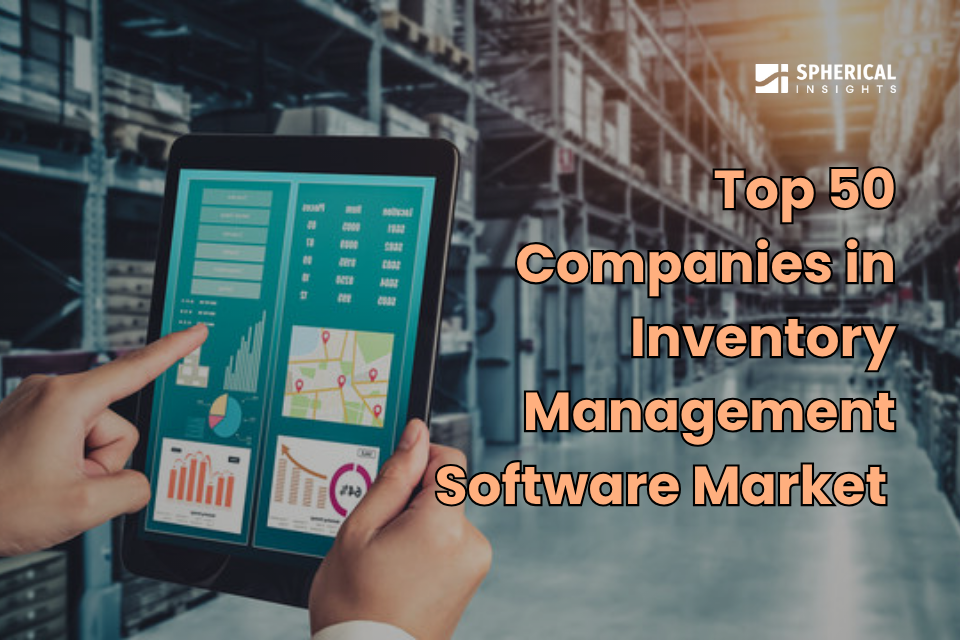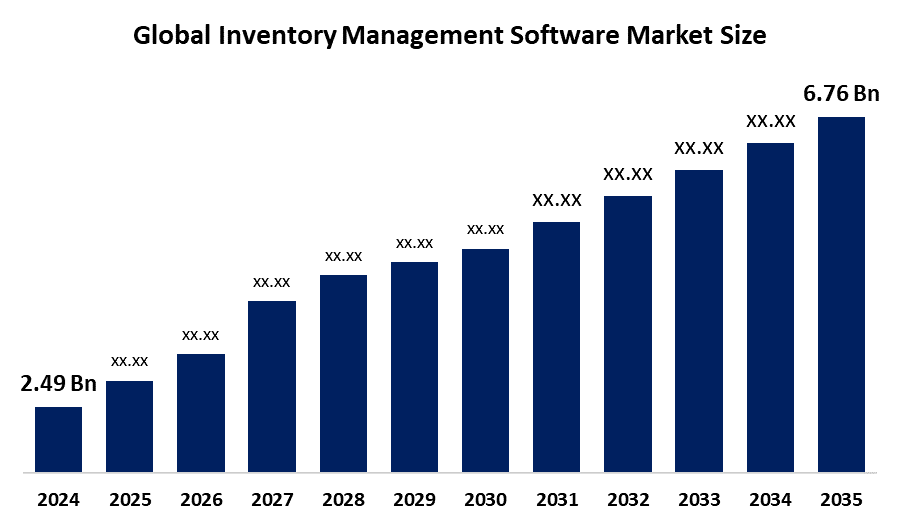
Top 50 Companies in Inventory Management Software Market: Key Insights & Innovations (2024-2035)
RELEASE DATE: Aug 2025 Author: Spherical InsightsRequest Free Sample Speak to Analyst
Description
According to a research report published by Spherical Insights & Consulting, The Global Inventory Management Software Market Size is projected To Grow from USD 2.49 Billion in 2024 to USD 6.76 Billion by 2035, at a CAGR of 9.5% during the forecast period 2025-2035. The primary driver of the global inventory management software industry is the simple and intuitive inventory tracking features. Orders, sales, delivery, and levels are all tracked using inventory management software. For iOS and Android devices, a wide variety of inventory management, control, and tracking applications are available.
Introduction
Inventory management software streamlines the processes needed to efficiently maintain inventory, handles reorders, updates accounting data, and automates inventory management. This software helps businesses reduce disruptions and product overstocks. With the use of this technology, inventory data that was previously kept in spreadsheets or copies can be arranged. Easy interaction with other company systems, like accounting software or Point-of-Sale (POS) systems, is one of the factors driving the growth of the inventory management software market. The market was positively impacted by the increase in investments in inventory management systems during the pandemic, which was prompted by the necessity for businesses to manage their stocks more effectively.
Navigate Future Markets with Confidence: Insights from Spherical Insights LLP
The insights presented in this blog are derived from comprehensive market research conducted by Spherical Insights LLP, a trusted advisory partner to leading global enterprises. Backed by in-depth data analysis, expert forecasting, and industry-specific intelligence, our reports empower decision-makers to identify strategic growth opportunities in fast-evolving sectors. Clients seeking detailed market segmentation, competitive landscapes, regional outlooks, and future investment trends will find immense value in the full report. By leveraging our research, businesses can make informed decisions, gain a competitive edge, and stay ahead in the transition toward sustainable and profitable solutions.
Unlock exclusive market insights - Download The Brochure now and dive deeper into the future of the Inventory Management Software Market.
Inventory Management Software Market Size & Statistics
- The Market Size for Inventory Management Software Was Estimated to be worth USD 2.49 Billion in 2024.
- The Market Size is Going to Expand at a CAGR of 9.5% between 2025 and 2035.
- The Global Inventory Management Software Market Size is anticipated to reach USD 6.76 Billion by 2035.
- North America is expected to generate the highest demand during the forecast period in the Inventory Management Software Market
- Asia Pacific is expected to grow the fastest during the forecast period in the Inventory Management Software Market.

Regional growth and demand
Asia Pacific is expected to grow the fastest during the forecast period in the inventory management software market. Automation is improving how businesses and governments operate in this area. Growing public and private investments in supply chain and inventory operations to increase automation use are also contributing to the region's market expansion.
North America is expected to generate the highest demand during the forecast period in the inventory management software market. The increasing need for effective supply chain management, along with the quick uptake of this technology, is anticipated to fuel growth in the region's inventory management systems market. A growing emphasis on multichannel inventory integration platforms and the expanding presence of major market players are also projected to propel the regional market's growth over the forecast period.
Top 10 trends in the Inventory Management Software Market
- Cloud-based inventory management solutions
- Artificial intelligence (AI) and machine learning integration
- Internet of Things (IoT) for real-time tracking
- Mobile inventory management and applications
- Predictive analytics and demand forecasting
- Integration with e-commerce and omnichannel platforms
- Warehouse automation and robotics
- Blockchain for supply chain transparency
- SaaS and subscription-based pricing models
- Sustainability and green inventory practices
1. Cloud-based inventory management solutions
Cloud-based systems are revolutionizing inventory management by allowing access to real-time inventory data from anywhere, enabling remote work and multi-location oversight. They provide automated backups, seamless upgrades, scalability, and easy integration with other business-critical applications. As a result, businesses especially small and medium enterprises are shifting from on-premise solutions to cloud platforms for greater flexibility, collaboration, and cost efficiency. This trend accelerates data-driven decision-making and supports fast-paced operational changes required by modern supply chains.
2. Artificial intelligence (AI) and machine learning integration
The integration of AI and machine learning in inventory software transforms how businesses optimize stock levels and forecast demand. AI-driven systems can analyze historical sales data, predict consumer trends, automate reordering, and reduce human error. Recent studies show that adopting AI can cut overstock by 20% and boost service levels by 15%. These technologies help organizations respond quickly to market fluctuations and supply chain challenges while enhancing profitability through precise inventory control.
3. Internet of Things (IoT) for real-time tracking
IoT-enabled devices and sensors provide up-to-the-minute data on inventory location, condition, and movement across warehouses, distribution centers, and retail outlets. With IoT, businesses get enhanced visibility and control, allowing early detection of inventory discrepancies, shrinkage, or delays. This improves not only inventory accuracy and loss prevention but also enables proactive management of replenishment and product flows, supporting leaner supply chains and better customer satisfaction.
4. Mobile inventory management and applications
Mobile apps are empowering warehouse staff and managers to conduct inventory operations directly on smartphones and tablets. Features such as barcode scanning, real-time updates, and stock alerts enhance flexibility and efficiency. Teams can perform audits, update records, and check inventories on the go—essential for businesses with distributed operations or fast-moving environments. This mobile-first approach increases operational agility, reduces bottlenecks, and enables swifter response to supply chain disruptions.
5. Predictive analytics and demand forecasting
Predictive analytics tools use advanced algorithms to combine historical patterns, seasonal factors, and external influences to forecast inventory needs more accurately. By employing demand forecasting, companies can avoid costly stockouts and overstock situations, optimize reordering policies, and align production with actual consumer demand. With market volatility and customer expectations rising, predictive analytics is becoming indispensable for efficient, cost-effective inventory management and strategic planning.
Empower your strategic planning:
Stay informed with the latest industry insights and market trends to identify new opportunities and drive growth in the inventory management software market. To explore more in-depth trends, insights, and forecasts, please refer to our detailed report.
Top 25 Companies Leading the Inventory Management Software Market
- SAP SE
- Oracle Corporation
- IBM Corporation
- Zoho Corporation
- Fishbowl Inventory
- Microsoft Corporation
- Manhattan Associates
- NCR Corporation
- Intuit Inc.
- NetSuite
- Acumatica
- Lightspeed
- Epicor
- Zebra Technologies
- SAGE Group
- Wasp Barcode Technologies
- QuickBooks Commerce
- Infor Inc.
- Odoo
- Brightpearl Ltd.
- Archon Systems
- Dear Systems
- Cin7
- TradeGecko (a QuickBooks company)
- SYSPRO
1. SAP SE – Headquarters: Walldorf, Germany
SAP SE is a global leader in enterprise resource planning (ERP) and inventory management software. SAP’s inventory management modules are widely used by large retailers, manufacturers, and logistics providers to optimize stock levels, automate order fulfillment, and enhance supply chain visibility. The system’s real-time analytics, powerful integration with IoT sensors, and AI-driven forecasting support rapid, data-driven decisions. SAP Inventory Management is known for its scalability, allowing businesses to manage multi-location warehouses and complex supply chains efficiently. As a pioneer in digital transformation, SAP leads the inventory management software market by consistently investing in innovations that address operational efficiency and sustainability.
2. Oracle Corporation – Headquarters: Austin, Texas, USA
Oracle Corporation is a major force in the inventory management software sector, with its Oracle NetSuite and Oracle Fusion Cloud solutions serving a broad array of industries. Oracle’s software delivers features such as automated replenishment, detailed inventory analytics, and seamless integration with procurement, accounting, and logistics. Customers value Oracle’s robust cloud infrastructure, which enables real-time inventory tracking and predictive analytics. By incorporating AI and machine learning, Oracle empowers businesses to reduce stockouts, improve supply chain resilience, and enhance customer experience. With a vast global presence and comprehensive support, Oracle holds a leading position in inventory software innovation and enterprise adoption.
3. IBM Corporation – Headquarters: Armonk, New York, USA
IBM is recognized for combining advanced inventory management software with consulting and implementation services. IBM’s solutions, including IBM Sterling Inventory Visibility, leverage cloud technology and AI-driven analytics to provide precise, real-time inventory data across diverse sales channels and geographies. The company’s focus on digital transformation and supply chain visibility makes its offerings highly suitable for large enterprises needing stringent control and scalability. IBM’s ongoing investments in automation, blockchain integration, and sustainability features ensure its software remains relevant as supply chain complexity grows. Its reputation for reliability and deep industry expertise further strengthens IBM’s standing in the market.
4. Zoho Corporation – Headquarters: Chennai, India / Pleasanton, California, USA
Zoho Corporation provides cloud-based inventory management software designed for small and medium-sized businesses. Zoho Inventory streamlines stock tracking, order management, and multi-channel integrations with platforms like Amazon, Shopify, and eBay. With features including barcode scanning, real-time reporting, and automated warehouse management, Zoho’s software is valued for its intuitive interface and flexible pricing. Deep integration across the Zoho ecosystem (CRM, finance, analytics) enhances operational efficiency and enables businesses to scale. Zoho’s focus on affordability, user experience, and robust automation tools has made it a popular choice for growing businesses worldwide seeking reliable inventory control.
5. Fishbowl Inventory – Headquarters: Orem, Utah, USA
Fishbowl Inventory specializes in inventory automation for small to mid-sized enterprises. Its software delivers solutions for inventory tracking, work order management, multichannel synchronization, and seamless QuickBooks integration. Fishbowl’s intuitive dashboard and support for barcoding, inventory costing, and warehouse transfers help businesses maintain accurate, real-time stock information. The software is customizable to various industries, including manufacturing, retail, and wholesale, providing users with flexibility and control. Fishbowl is highly regarded for balancing powerful automation features with ease of use, supporting operational efficiency for businesses aiming to improve supply chain management techniques and grow in a competitive marketplace
Are you ready to discover more about the inventory management software market?
The report provides an in-depth analysis of the leading companies operating in the global inventory management software market. It includes a comparative assessment based on their product portfolios, business overviews, geographical footprint, strategic initiatives, market segment share, and SWOT analysis. Each company is profiled using a standardized format that includes:
Company Profiles
- SAP SE
- Business Overview
- Company Snapshot
- Products Overview
- Company Market Share Analysis
- Company Coverage Portfolio
- Financial Analysis
- Recent Developments
- Merger and Acquisitions
- SWOT Analysis
- Oracle Corporation
- IBM Corporation
- Zoho Corporation
- Fishbowl Inventory
- Microsoft Corporation
- Manhattan Associates
- NCR Corporation
- Intuit Inc.
- Others.
Conclusion
The inventory management software market is poised for sustained growth, driven by the rapid adoption of cloud-based platforms, AI-driven analytics, and mobile-first solutions. As businesses strive for greater supply chain efficiency and agility, integration with IoT and predictive analytics is enabling real-time visibility and smarter decision-making. Major players like SAP, Oracle, IBM, Zoho, and Fishbowl Inventory are leading innovation and setting standards in reliability and scalability. The market's evolution is also shaped by the rise of e-commerce, automation, and the need for sustainability.
About the Spherical Insights & Consulting
Spherical Insights & Consulting is a market research and consulting firm which provides actionable market research study, quantitative forecasting and trends analysis provides forward-looking insight especially designed for decision makers and aids ROI.
Which is catering to different industry such as financial sectors, industrial sectors, government organizations, universities, non-profits and corporations. The company's mission is to work with businesses to achieve business objectives and maintain strategic improvements.
CONTACT US:
For More Information on Your Target Market, Please Contact Us Below:
Phone: +1 303 800 4326 (the U.S.)
Phone: +91 90289 24100 (APAC)
Email: inquiry@sphericalinsights.com, sales@sphericalinsights.com
Contact Us: https://www.sphericalinsights.com/contact-us
Need help to buy this report?